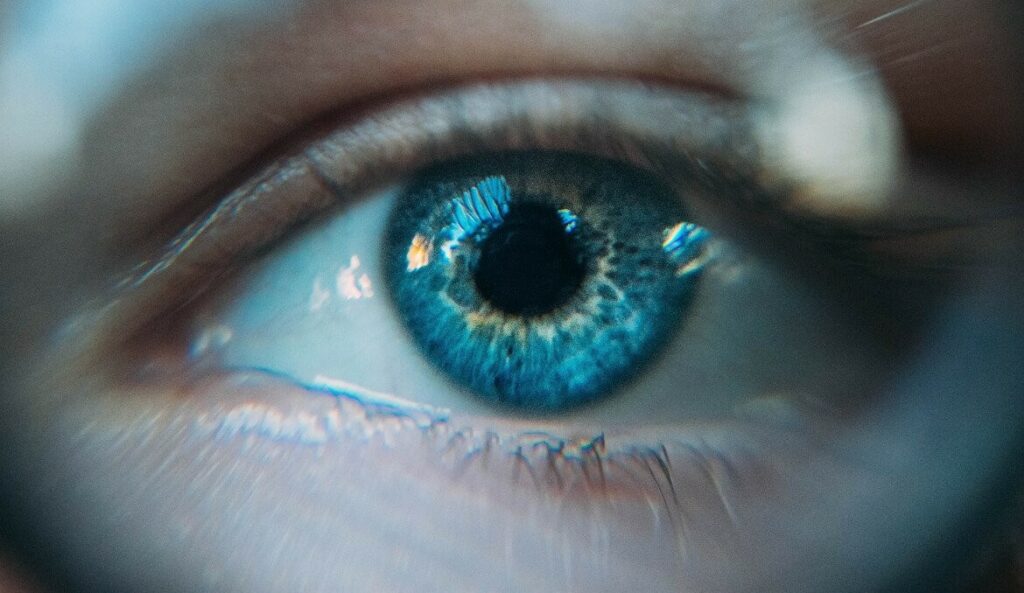We all suffer from it at times: a twitching eyelid. Usually it takes a few minutes, but it can also tease you for days. We want to reassure you first: a twitching eyelid is harmless in itself. But it can have an important underlying cause.
If you regularly suffer from a twitching eyelid, it is wise to take a moment to think about the possible cause. Maybe this article will ring a bell.
Can we help you?
Leave us your information and one of our coaches will contact you in 24H

Why does my eyelid shake?
Everybody suffers from a twitching eyelid at some point. It is an unpleasant feeling, which suddenly occurs and then suddenly disappears again. The culprit is our seventh cranial nerve, the facial nerve. This nerve is responsible, among other things, for our facial expressions. It controls the muscles in our face, such as the corners of our mouth, cheeks and eyelids. When this nerve becomes overactive, it causes fasciculations. These are small muscle vibrations under the skin that cause short and small movements.
Do you wonder why your facial nerve is overactive? Usually the cause is found in too high a level of stress and severe fatigue. If you regularly or for a long period of time suffer from a twitching eyelid, this can be a warning signal and it is wise to take it back.
To a lesser extent, a lack of magnesium and vitamin B12 or excessive use of alcohol or caffeine can play a role in a twitching eye.
Is your eye tremor caused by stress?
Most people know when they are stressed. They think it is temporary and quickly dismiss the danger associated with prolonged stress. The great thing is that we are warned when something in our body is not going well. Pain is the best known alarm signal. But there are also much more subtle alarm signals that warn us of danger.
We can easily shake off these little signals. People with willpower and perseverance are therefore often victims and chronic stress and burnout. They don’t have time to think about their ‘complaints and pains’ and want to move on. But if your body thinks differently, warns you with countless signals and gradually sabotages your happiness, then one day there will be nothing left to want. Chronic stress and burnout can completely paralyse you from one day to the next.
Back to your twitching eyelid. It is really wise to ask yourself whether there are any other complaints. Are you tired, for example? Let’s first look at the cause of your fatigue.
Twitching eyelid due to eye fatigue
Do you work behind a screen for a long time every day? Then it’s not surprising that your eyes get tired in the long run. Staring at a screen, even on your smartphone or tablet, demands a lot of effort from your eyes. This also applies to prolonged reading or a strenuous, long drive in the dark or in the rain. If focusing for a long time does not alternate with sufficient interruptions, your eye muscles become tired and your facial nerves gets overexcited. A twitching eyelid can be a consequence of this.
Avoiding overly tired eyes is actually quite simple: give your eyes regular rest. Take a break after a maximum of 2 hours behind your screen. Also make sure there is enough light. When you work behind a monitor, you blink less with your eyes. This can make your eyes too dry. A time-out, but also a good humidity, contribute to healthy eyes.
Strenuous staring can also cause annoying headaches. If I had sat behind my screen for a long day, I would have suffered from it myself. Do you wear glasses? Since I’ve been wearing monitor glasses, I suffer considerably less from headaches. A visit to the optician can therefore solve this problem.
Twitching eyelid due to mental fatigue
A completely different form of fatigue is mental fatigue. By this we don’t mean the tiredness we feel after an exciting performance or a long working day, but a tiredness you already feel when you wake up in the morning. Where a day of relaxation or a long night’s sleep solves nothing. You are exhausted, you no longer have energy and motivation and you can no longer concentrate well. That is the kind of fatigue we mean.
Tiredness is a symptom of stress. Extreme fatigue, exhaustion that you feel both physically and mentally, is a symptom of burnout. Stress and burnout, in addition to fatigue, have an enormous list of symptoms.
Be wary of ‘vague’ complaints
Because certain complaints are ‘vague’, and a twitching eyelid is one of them, we do not directly associate them with stress. Still, your twitching eyelid can be a sign of too much and too long lasting stress. Such a small signal can be accompanied by other symptoms that are easier to recognise. Let’s mention the 10 most important symptoms of a burnout:
- Mental and physical exhaustion or extreme fatigue
- Being cynical
- Poor ability to sleep
- Worrying and moping
- Being anxious, for example, to fail
- Feeling insecure and lacking in self-confidence
- Being tense, getting angry quickly
- Headache
- Being restless and feeling aggitated
- Chest pain.
We do not want to worry you. But it is just as good to think about your health if you recognise one or more of the above symptoms in addition to a shaky eyelid and other subtle symptoms.
Is this the case? Then it is time to apply the brakes. No, not later, but now.

Vibrations due to nutrient deficiency
It has not been scientifically proven, but it does indicate that a deficiency of vitamin B12 and magnesium affects the functioning of our cranial nerves, not just our facial nerve. In addition to trembling eyes, a deficiency can also affect other parts of our body, such as hands, fingers, head, feet and the like.
Vitamin B12 ensures, among other things, a good build-up and proper functioning of the nerves. If you have too little of these vitamins in your body, you can get complaints. Think of tingling, numb toes and fingers, balance problems or problems with your motor skills. By eating healthy we get enough vitamin B12 daily. If you suffer from these complaints, are anaemic or are a vegetarian or vegan and do not eat animal products, you can have your blood tested for the presence of B12 in your body by your GP.
It is not for nothing that magnesium is called our ‘anti-stress mineral’. This mineral relaxes our muscles and nerves. A shortage of magnesium can disrupt the transmission of nerve impulses. It is difficult to determine magnesium deficiency yourself. Your family doctor can do this by checking your blood and cell values.
Vibrations and trembling due to stress
So your eyelid may start to shake if you stare too long or eat unhealthy. However, if you suffer from tiredness and other (sometimes vague) complaints in addition to a shaky eyelid, then stress plays too big a role in your life. By intervening now, you prevent yourself from getting burnout. Living with stress is hard enough, but living with a burnout is really awful.
Our bodies have an ingenious system that ensures that we are able to cope with short-term overload of our nervous system and respond alertly to imminent danger. However, this great system cannot cope with prolonged overload. If this is the case, we receive warnings in the form of physical and psychological complaints.
Stress can literally make us shake and tremble. We call these movements tremors. They are involuntary movements that can occur in all our limbs and many parts of our body.
How do I deal with my stress?
Ask someone what you can do about stress and they will say: relax more. But relaxing is very difficult for someone who has been suffering from stress for a long time. It takes a lot of effort to rediscover how ‘relaxed’ feels.
Doing relaxation exercises on a daily basis brings you to rest in a reasonably simple and quick way. Equally important, however, is that you discover why you have become so stressed. And how you can change this. And that’s not easy for everyone.

Training and coaching
Milltain provides training and coaching for private individuals and organisations. Our team consists of 35 coaches and trainers who have now helped thousands of people struggling with stress and burnouts.
Milltain for private individuals:
Are you stuck in life because of stress or a burnout? We developed an effective online program that is fully focused on the complete recovery from a burnout. More than 2000 people have successfully completed this training!
Movement and nature play prominent roles in this training. Recovery is a process that contains peaks and troughs, and that’s something we know all about. Our highly experienced coaches provide you with active support.
Learn more: Stress and burnout coaching
Stress & burnout coaching; for 100% recovery!
Reducing stress and recovering from burnout is simply incredibly difficult. The coaches at Meulenberg Training & Coaching understand exactly what you are going through and know how tough it can be. They have often experienced it themselves! With their years of experience and expertise, they are ready to help you step by step toward a full recovery. The results of our one-on-one coaching and absenteeism training will benefit you for a lifetime!






